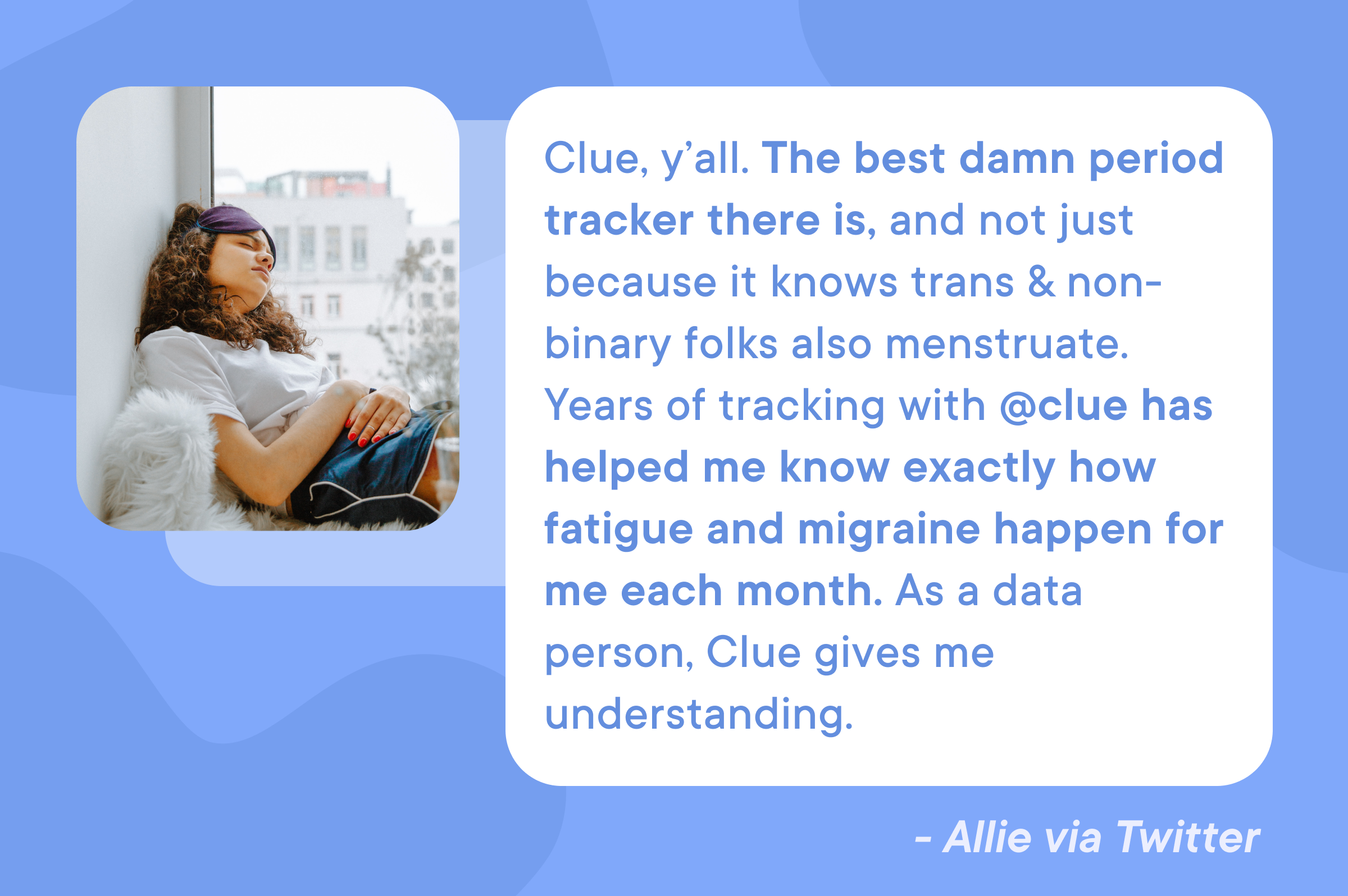Photo by Franz Grünewald; Art direction by Marta Pucci
Cycle tracking puts you in charge
Clue’s Chief Medical Officer, Dr. Lynae Brayboy, shares 6 ways tracking with Clue can really help you.

In medicine there are ethical principles that guide physicians' interactions with people under their care. Respecting a person’s autonomy is one of these fundamental principles. You may have heard the term bodily autonomy, which is the ability to have self-rule and control over one’s health and healthcare.
Reproductive autonomy, or the ability to make choices about your reproductive care, can only be truly achieved with access to health education. When people understand how their bodies and menstrual cycles work, along with basic anatomy of the reproductive system, this is called health literacy. Health literacy AND access to information about your body’s unique patterns, can help you make informed, personal choices that better suit your reproductive life goals.
How does period tracking help my health?
Researchers have shown that period tracking helps women and people with cycles understand their bodies, prepare for events like the arrival of a period, and conceive a pregnancy (1). Importantly, this information is a tool that can be shared with healthcare providers to help them provide personalized care and counsel you about patterns and changes you may notice. Clue provides this health education and personalized insight for our community. Let’s take a look at the ways tracking your cycle with Clue can help you.
1. Know your baseline and notice changes
Healthcare professionals consider your menstrual cycle an indicator of your body’s functions because in order to have a period, many elements including the brain (specifically a region called the hypothalamus), the pituitary gland (a gland at the base of the brain that controls the endocrine system), the ovaries, and the uterus have to work together.
The menstrual cycle can vary based on what a person eats, drinks and does, as well as their overall health status, but when a person’s cycle changes abruptly and continues that way, it means something is different. A period might be late because you are pregnant, or it could be caused by other serious changes in your body that should be evaluated by a healthcare provider.

Whatever the changes may be, understanding your cycle baseline, or what’s typical for you, can help you notice when something is off. Then, you can speak with a healthcare provider about next steps. Usually they will ask you questions about your health, examine your body, run blood tests, and sometimes ultrasounds or other imaging.
2. Be ready for your period, and the experiences that come with it
Period preparedness isn’t just about making sure you have pads, tampons, or your menstrual cup on hand. For 75% of women and people with cycles, the menstrual cycle can mean managing other experiences that cause discomfort and pain (2).
Asthma, rheumatoid arthritis, epilepsy, irritable bowel syndrome, depression, and migraine (3) are just a few of the conditions that have been studied in relation to the menstrual cycle. Some conditions like these are sensitive to changes in the hormones made by the ovaries. Changes in levels of the hormones estradiol (a form of estrogen) and progesterone can impact the functions of the nervous system and immune system. Knowing where you are in your cycle, or when your period is predicted to start, can help you feel better prepared and more comfortable.
Let’s take the case of migraine, which is 2-3 times more common in women. This means about 28 million American women (4) live with migraine, a neurological condition that causes debilitating headaches and impacts other parts of the body. Half of women who experience migraine episodes report that they are linked with their menstrual cycle. Migraine can prevent people from functioning as they would like to, impacting work and relationships. Taking medication either during episodes or to prevent episodes can alleviate pain(5) and improve a person’s daily life. Having an idea about when your period is coming allows you to fill your prescription(s) and have it on hand so you can get on with your life.

3. Plan a pregnancy
As a fertility specialist, many of the patients I have encountered weren’t really “infertile”. They simply didn’t know how to time sex or home inseminations to become pregnant. Unfortunately, sexual health education is often lacking from high school (6), college (7) and all the way to medical school (8) in many countries. Even as a physician, I didn’t fully understand how the menstrual cycle worked until I specialized in reproductive endocrinology (which relates to your reproductive hormone function and fertility).
The scientific articles on helloclue.com and the episodes in our podcast Hormonal are created to bridge the sex ed gap.
The wonderful thing about tracking your cycles when you are trying to conceive is that you will know precisely the first day of your last menstrual period. This makes pregnancy dating (your due date) more accurate, allowing your healthcare provider to time your pregnancy care, interpret essential prenatal tests, and manage your birth (9). If you don’t become pregnant, you will know exactly how many cycles you have been trying. This information is important because you will need it in order to have a diagnosis to be eligible for insurance coverage (which varies by state and country) for evaluation by your healthcare provider and referral to a fertility specialist.
4. Know your options in the event of an unintended pregnancy
Abortion is now criminalized in some states in the USA. Due to the threat of prosecution for having an abortion, cycle tracking may be a critical tool to recognize late periods. Period tracking helps you to recognize missed periods and make earlier decisions like having a medication abortion. Otherwise it can be hard to remember the first day of your last menstrual period and medication abortion is limited to 70 days or 10 weeks gestational age (10).
This is important because when or if you can access abortion is now determined by the state in which you live and could be restricted to as early as 6 weeks of pregnancy.
5. Advocate for yourself with your healthcare provider
Perhaps the most important aspect of understanding your typical menstrual cycle pattern is being aware of changes that are unique to you. This is also true of tracking your pregnancy using the Clue Pregnancy feature.

If something is different, you can be empowered to speak to your healthcare provider about the changes and show your data if you choose to. Unfortunately, medical gaslighting, when a person isn’t heard or believed, does happen sometimes (11). If you feel you aren’t being taken seriously, having access to your own data puts you in control. You can use it to get a second opinion.
The other great thing about tracking is that you and your healthcare provider can determine if your treatment regimens are working by tracking improved or reduced symptoms, or other changes in experiences. This is especially helpful for slight changes that occur over a long period of time like less acne, changes in interest in sex after treatment for improving sex drive, or changes in bleeding patterns after an IUD.
6. Change the future of menstrual and reproductive health research
Finally, creating a Clue account and tracking your cycle contributes to an unprecedented dataset that is advancing research in an area that impacts you directly. Women’s health and the health of all people with cycles, has been notoriously underfunded and under-researched, limiting our understanding of menstrual and reproductive health and therefore the quality of healthcare.
Two real-life examples tell the story of the need for more funding for this area of health research: The development of the birth control pill (12) and in vitro fertilization (IVF) (13), were not funded with tax dollars, but rather private support. Unfortunately, public funding or dedicated tax dollars for women’s health research is still very low compared to genetics, aging, pediatrics, and even rare diseases (14).
A smaller amount of money means that fewer researchers will have grants to conduct research focused on women’s health. Less grants means less published papers which equals less knowledge and information and fewer healthcare breakthroughs for women. Women's health issues are public health issues that not only affect women, but future generations.
Clue actively contributes to changing the status quo by helping academic researchers recruit study participants and by collaborating with vetted scientists at top institutions. These researchers and scientists can use de-identified Clue tracking data to answer important questions about reproductive health and the menstrual cycle. There is so much more to learn that could improve the lives of women and people with cycles.
The bottom line
Cycle tracking empowers you to become aware of your unique patterns and take action based on your personal data. Our goal at Clue is to put you in control and to help you optimize your reproductive knowledge and health.
Everything in our app is written, fact checked, and reviewed by women’s health experts including IVF nurses, Certified Nurse Midwives, Women’s Health Nurse Practitioners, Doctors of Nursing Practice, obstetrician/gynecologists (OB/GYNs) and reproductive endocrinologists (REIs), all with your reproductive health in mind.
